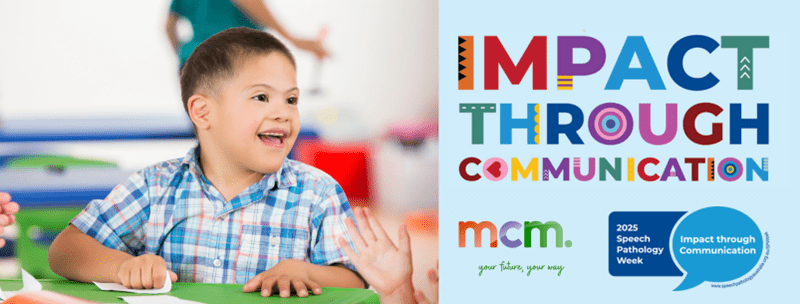- About
- Services
- Advocacy
- Support us
- News
- Publications
- Careers
- Contact
 24 August 2025
24 August 2025
This week is Speech Pathology Week, a week to celebrate impact through communication.
Communication is how children connect and explore the world around them. Our Early Childhood Intervention Services (ECIS) team know that communication is more than just words. It’s about sharing thoughts, feelings, and needs in many ways through gestures, signs, AAC devices, and pictures.
Every way is important, meaningful, and worth celebrating.
Here’s how communication shows up in everyday family life and some practical ways parents, guardians and educators can work together to help grow these skills.
Example: Your toddler points at a favourite toy, and you respond by naming it and passing it to them.
This back-and-forth helps build attention, understanding, and warm connections.
Tips for parents:
Example: Your child proudly says their name clearly at kindergarten for the first time.
Being understood boosts their confidence and helps them join in with friends.
Tips for parents:
Example: At group time, your child chooses the song by tapping it on their AAC device.
This gives them a way to join in and feel part of the group.
Tips for parents:
Example: Your child shows a “need a break” card when things feel too much.
Knowing how to communicate needs gives children more control over their day.
Tips for parents:
Example: At the playground, your child waves “hello” to a new friend.
Small gestures can open the door to new friendships and social skills.
Tips for parents:
Example: Your child uses Key Word Sign to say they feel “sad”, and you respond with comfort.
Communication helps children share feelings and supports their emotional wellbeing.
Tips for parents:
Example: At breakfast, your child uses a picture to choose their favourite cereal.
Having a way to make choices builds independence and self-confidence.
Tips for parents:
Children thrive when they can express themselves in ways that are seen, heard and understood. Every child has the right to be heard, in whatever way works for them.
At MCM our ECIS speech pathologists work alongside families to help every child to find their voice, whether it’s through words, signs, pictures or devices.
If you’d like to learn more about our Early Childhood Intervention Services or speak to one of our speech pathologists, or contact us via our enquiry form.